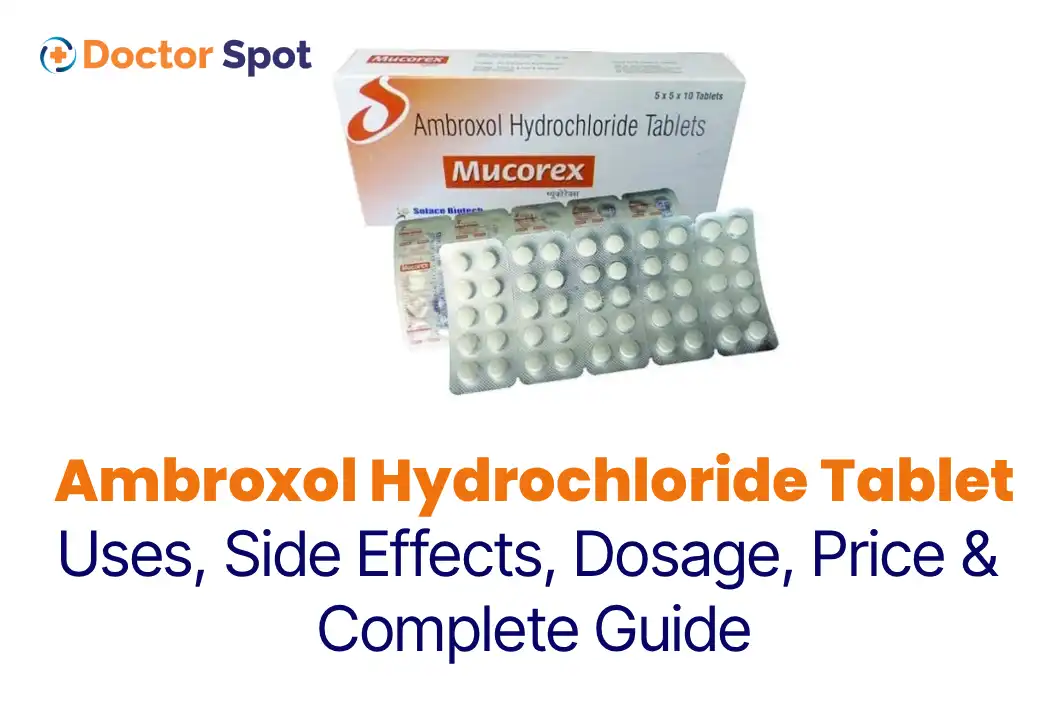Ambroxol Hydrochloride Tablet: Uses, Side Effects, Dosage, Precautions and More

Ambroxol Hydrochloride is a widely used medication in the treatment of respiratory conditions. Known for its mucolytic properties, it helps in breaking down mucus, making it easier to expel and relieving congestion. This blog post will provide an in-depth look at Ambroxol Hydrochloride, including its uses, side effects, dosage, precautions, and other essential information.
What is Ambroxol Hydrochloride?
Ambroxol Hydrochloride is a mucolytic agent, which means it helps to break down mucus, making it less thick and sticky. This action facilitates the expulsion of mucus from the respiratory tract. It is commonly prescribed in the form of tablets, syrups, and inhalers for the treatment of various respiratory conditions.
Uses of Ambroxol Hydrochloride
- Chronic Obstructive Pulmonary Disease (COPD): Ambroxol helps manage COPD by reducing mucus viscosity, improving airflow, and reducing the frequency of exacerbations.
- Bronchitis: In both acute and chronic bronchitis, Ambroxol reduces the mucus build-up, eases coughing, and helps clear the airways.
- Asthma: Though not a primary treatment for asthma, Ambroxol can be used adjunctively to reduce mucus accumulation in the airways.
- Cystic Fibrosis: This genetic condition causes thick, sticky mucus to build up in the lungs. Ambroxol helps in thinning the mucus, making it easier to expel.
- Respiratory Infections: During infections like pneumonia, Ambroxol aids in clearing the mucus, facilitating better breathing and recovery.
Mechanism of Action
Ambroxol Hydrochloride works by stimulating the production of surfactant in the lungs, which reduces the stickiness and thickness of mucus. It also enhances the ciliary activity in the respiratory tract, promoting the movement of mucus out of the airways.
Side Effects of Ambroxol Hydrochloride
While Ambroxol Hydrochloride is generally well-tolerated, it can cause some side effects, including:
- Gastrointestinal Issues: Nausea, vomiting, diarrhea, and stomach pain are common side effects.
- Allergic Reactions: Skin rash, itching, and hives can occur. In rare cases, severe allergic reactions like angioedema and anaphylaxis may develop.
- Respiratory Issues: While rare, some patients may experience a paradoxical increase in bronchial secretions.
- Headache and Dizziness: Some users may experience headaches or dizziness.
Dosage of Ambroxol Hydrochloride
The dosage of Ambroxol Hydrochloride can vary based on the condition being treated, the patient’s age, and the form of medication. Here are general dosage guidelines:
- Adults: The usual dose for adults is 30 mg taken orally 2-3 times daily. In severe cases, the dose can be increased to 60 mg 2-3 times daily.
- Children:
- For children aged 6-12 years, the recommended dose is 15 mg taken orally 2-3 times daily.
- For children under 6 years, the dose is typically 7.5 mg taken 2-3 times daily.
- Syrup Form: Dosing for syrup form should follow the prescribed instructions, typically 2.5-10 ml depending on age and severity of the condition.
- Inhalation: The inhalation solution dose usually ranges from 15-22.5 mg 1-2 times daily, depending on the severity of symptoms and patient response.
Precautions and Warnings
- Pregnancy and Breastfeeding: Ambroxol Hydrochloride should be used with caution during pregnancy and breastfeeding. It is essential to consult a healthcare provider to evaluate the benefits and potential risks.
- Allergic Reactions: If you have a history of hypersensitivity to Ambroxol or any other mucolytic agents, avoid using this medication.
- Liver and Kidney Issues: Patients with severe liver or kidney impairment should use Ambroxol cautiously, as it is metabolized in the liver and excreted by the kidneys.
- Peptic Ulcers: Patients with a history of peptic ulcers should use Ambroxol with caution due to its potential to irritate the gastrointestinal tract.
- Interactions with Other Medications: Inform your healthcare provider about all the medications you are taking, as Ambroxol can interact with antibiotics like amoxicillin, cefuroxime, and erythromycin, enhancing their penetration into the bronchial secretions.
Overdose
In case of an overdose, symptoms may include nausea, vomiting, and diarrhea. Immediate medical attention is required. Treatment is symptomatic and supportive.
Storage
Store Ambroxol Hydrochloride tablets at room temperature, away from moisture, heat, and direct light. Keep out of reach of children.
Conclusion
Ambroxol Hydrochloride is an effective mucolytic agent that aids in the management of various respiratory conditions by reducing mucus viscosity and facilitating its expulsion. While generally safe, it is essential to follow the prescribed dosage and be aware of potential side effects and precautions. Always consult with a healthcare provider before starting any new medication to ensure it is appropriate for your specific condition.
By understanding the uses, side effects, dosage, and precautions associated with Ambroxol Hydrochloride, patients can make informed decisions and effectively manage their respiratory health.
Disclaimer:
All information and content on this site are provided for informational and educational purposes only. They are not a substitute for professional medical advice, diagnosis, or treatment. Always seek the guidance of a qualified healthcare professional for any health-related concerns or conditions.
Also read: Niacinamide Tablet: Uses, Side Effects, Dosage, Precautions and More